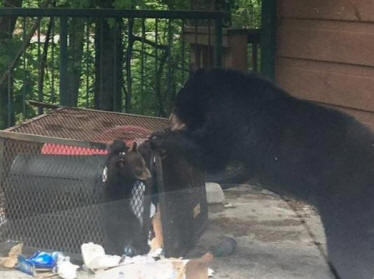
The Great Smoky Mountain Journal
Source:
Tuesday, January 01, 2019 02:40 PM
TWRA (Tennessee Wildlife Resource Agency) Tells Citizens Bear Season Is Upon Us And Be Prepared
According to TWRA Black Bear Coordinator Dan Gibbs, bear activity is expected to increase at this time of the year as it is the season when black bears emerge from their winter dens. They use this time to search for food to replenish their energy.
In a post on Facebook, TWRA reported that Green County residents have recently reported seeing a black bear roaming the county. Greene County TWRA officer David Carpenter said that the bear was seen in the Tusculum area over the last few days.
Residents in that area are asked to temporarily remove any food source that may be attracting the bear such as bird feeders and outdoor pet foods. It is also advised that citizens keep their trash in a bear resistant container or inside.
Once the bear has moved on, TWRA said, things will return to normal; however, it is the responsibility of Greene County residents to prevent the bear from acclimating to human foods.
With the recent sighting, TWRA wants to take the time to educate Tennessee residents about living alongside bears.
In general, the organization said, residents and visitors to the area should be proactive to make sure bears remain wild and reduce human-bear interactions. Bears that are attracted to human food sources or that are deliberately fed by humans have a relatively short life.
According to the TWRA, bears that receive food from people have a fraction of the survival rate that "wild" bears that do not regularly interact with humans have. "The deliberate and accidental feeding of bears is socially irresponsible," the TWRA Facebook post said.
"Bears that habituate to human presence eventually become a threat to human safety and the end result is that such bears are often killed by intolerant or fearful landowners or have to be destroyed," the post continued.
Though the primary action to reduce these occurrences is to keep bears from human foods, state and federal agencies have met significant obstacles to bring even moderate changes to human behavior to achieve greater safety for humans and bears.
Wildlife biologists believe the bear population is expanding and estimate the population to be at 6,500-7,000, according to the TWRA.
To help ensure a viable future for the black bears, TWRA asks residents and visitors to remember these tips:
- Never feed or approach bears
- Do not store food, garbage or recyclables in areas accessible to bears
- Remove bird feeders where bears are active
- Feed outdoor pets a portion size that they eat completely
- Store pet foods securely
- Keep grills and smokers clean and stored in a secure area if not used
- Talk to family and neighbors when bear activity is occurring in the area
For visitors at campgrounds and picnic areas, the U.S. Forest Service has some tips as well:
- Keep a clean site by properly disposing of garbage such as: fruit rinds and cores, aluminum foil that has been used to cook or store food, plastic wrap and bags that have stored food and empty cans and jars
- Pick up food and scraps from your site
- Never leave food or coolers unattended unless inside a vehicle or hard-sided camper
- Wipe down tabletops before vacating your site
They also advise on what to do if a bear visits your campsite:
- Pack up your food and trash
- If necessary, attempt to scare the animal with loud shots, banging pots and pans or even throwing rocks or sticks
- Move slowly away to your vehicle or secure area

